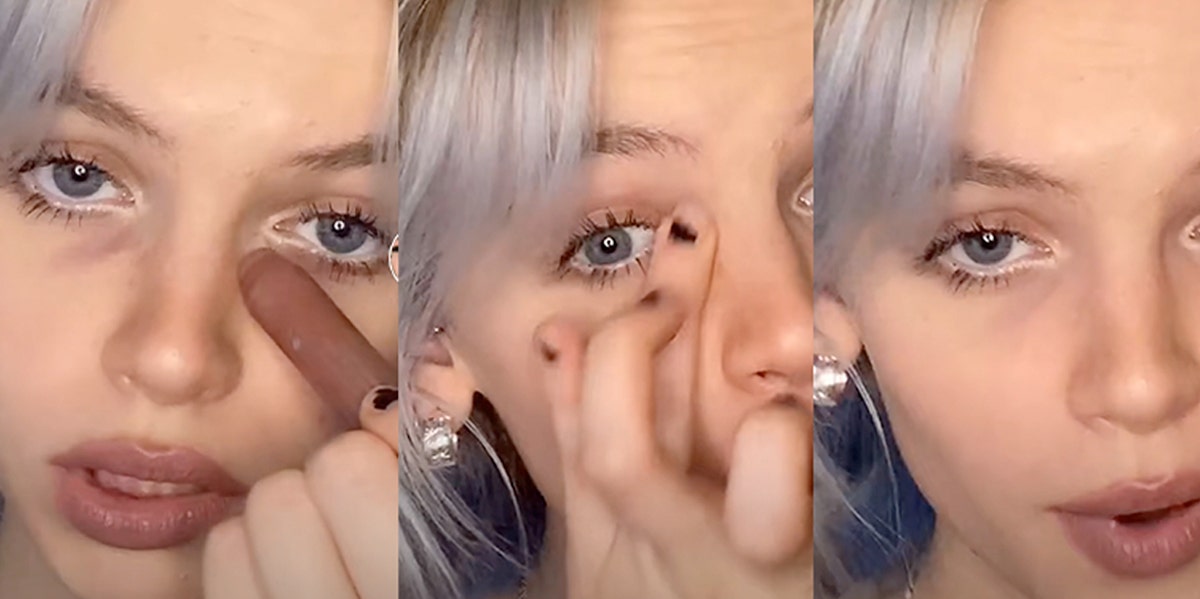TikTok's Latest Beauty Trend Is Dark Under-Eye Circles – But Social Media Is Divided On Its Ethical Implications
The TikTok trend has been accused of racial insensitivity and promoting unhealthy habits.
 TikTok
TikTok A recent TikTok trend has members of the beauty community putting makeup under their eyes to create the look of dark circles.
One post demonstrating the technique, created by model and influencer Sara Carstens in late December 2020, has received over a million likes.
In the video, the 19-year-old mouths the lyrics to a remix of “Greek Tragedy” by the Wombats as she smudges dark red lipstick beneath her big blue eyes.
Carstens explained her intentions in an interview: “The entire goal is to normalize dark circles,” she said.
“It can be beautiful,” Carstens declared. Furthermore, she added, “We’re Gen Z. We’re all tired and have bad sleeping schedules.”
RELATED: What Is An 'Alt Girl' On TikTok? The Trend & Style Defined
Other videos followed, inspired by Sara’s. Some users applauded the trend, saying that it helped them embrace their insecurities.
“Are we finally gonna make this a trend?” one comment read. “I am so happy. My bags are huge.”
However, others took issue with the look for several different reasons.
A few resented the fact that their insecurities were being commodified.
“What TikTok does is they take people’s insecurities and use them as a trend and once they get old they throw them away,” one user criticized.
Some pointed out that dark pigmentation around the eyes is often an ethnic characteristic, especially for those of Asian or Middle Eastern descent.
Siddhi Uppaladadium, a 17-year-old New Jersey girl of Indian descent said, "People of color always have these dark eye bags because we’re more prone to hyperpigmentation. Seeing someone take that, something we’ve been like mocked for and chastised for, into a trend, it kind of makes me a little upset.”
People with genetic under-eye circles have often faced public reproval, or been bullied for not conforming to Western beauty standards.
Plastic surgeon and skincare expert Dr. Tanuj Nakra explained that “all ethnicities with intermediate to high melanin levels are susceptible to dark circles caused by hyperpigmentation.”
Of the pressure on these individuals to cover the feature, Nakra said, “The global subconscious desire for more pigmented cultures to appear ‘more white’ as an ironic response to systemic racism cannot be underestimated.”
In light of this, some find it offensive that white women, who already fit Western beauty standards, are receiving positive attention for the same characteristic that was a source of shame for some minorities.
The response is reminiscent of last year’s “fox eye” trend, which was considered to be offensive to some Asian ethnicities.
RELATED: 5 Reasons Unhealthy Eating Habits Should Not Be Glamorized
Others worried that the trend would glamorize mental illness or unhealthy habits, such as drug use.
One compared it to the “heroin chic” phenomenon of the '90s, which encouraged dangerous habits for the sake of aesthetics.
Hallmarks of the heroin chic look included dark circles, as well as pale skin, and an underweight figure.
As its name suggests, the fad glamorized the use of hard drugs.
Heroin chic was the signature look of models such as Kate Moss, who was a cocaine addict.
Thanks to the fashion industry’s endorsement of the skin-and-bones body image, there was an uptick in people checking into rehab for eating disorders all over the country.
Despite efforts to discourage its promotion of harmful behaviors, heroin chic never really went out of style, and many of today’s trends contain echoes of the era.
In light of this, the “new” under-eye trend is far from pioneering.
Today, popular media has taken strides towards supporting a healthier and more inclusive standard of beauty.
Is the dark circle TikTok trend just a harmless makeup look, or does it signify a potential step backward for society?
Allie McGlone is a writer who covers a variety of topics for YourTango, including pop culture and entertainment.

